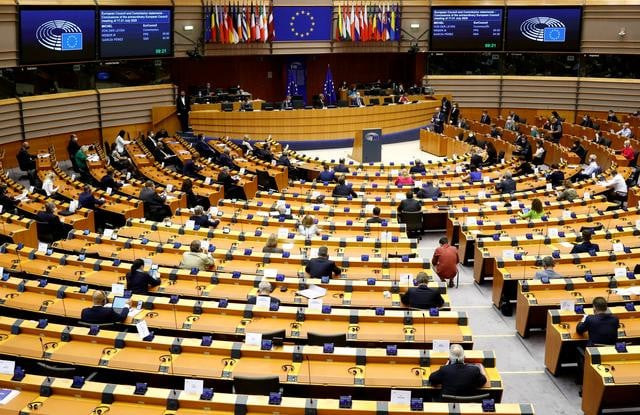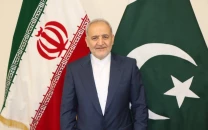Blasphemy law: EU Parliament’s decision to review GSP+ status irks Pakistan
Resolution calls on EEAS to immediately review Pakistan’s eligibility for GSP+ status over blasphemy law abuse

Islamabad on Friday expressed its disappointment over a resolution adopted on Pakistan’s blasphemy laws by the European Parliament, which also called for a review of GSP (Generalised Scheme of Preferences) plus status of the country.
The resolution, adopted on Thursday, demanded of Pakistan to allow space for religious freedom and urged the EU authorities to review the country’s GSP+ status amid "alarming" number of blasphemy cases.
It said that there has been an alarming increase in accusations of blasphemy online and offline in Pakistan over the past year. "Many of these accusations target human rights defenders, journalists, artists and the most marginalised people in society," it added.
It said that Pakistan’s blasphemy laws are increasingly used for personal or political score‑settling in violation of the rights to freedom of religion and belief and of opinion and expression.
Responding to media queries today, Pakistan’s Foreign Office Spokesperson Zahid Chaudhri said, “The discourse in the European Parliament reflects a lack of understanding in the context of blasphemy laws and associated religious sensitivities in Pakistan – and in the wider Muslim world."
"The unwarranted commentary about Pakistan's judicial system and domestic laws are regrettable," he added.
The spokesperson said Pakistan being a parliamentary democracy with a vibrant civil society, free media and independent judiciary, remained fully committed to the promotion and protection of human rights for all its citizens without discrimination. “We are proud of our minorities, who enjoy equal rights and complete protection of fundamental freedoms as enshrined in the Constitution. Judicial and administrative mechanisms and remedies are in place to guard against any human rights violations," he added.
The spokesperson mentioned that Pakistan had played an active role in promoting freedom of religion or belief, tolerance and inter-faith harmony.
At a time of rising Islamophobia and populism, the international community must exhibit a common resolve to fight xenophobia, intolerance and incitement to violence based on religion or belief, and work together to strengthen peaceful co-existence, he stressed.
The spokesperson further said Pakistan and the European Union had multiple mechanisms in place to discuss entire spectrum of bilateral relations, including a dedicated Dialogue on Democracy, Rule of Law, Governance and Human Rights. "We would continue to remain positively engaged with the EU on all issues of mutual interest," he maintained.
According to the resolution, the judicial procedures in blasphemy cases in Pakistan are "highly flawed" where low standards of evidence are required for a conviction and judicial authorities often uncritically accept allegations. "The accused are often presumed guilty and have to prove their innocence rather than vice versa."
It expressed concern regarding the case of couple Shagufta Kausar and Shafqat Emmanuel, who were sentenced to death on blasphemy charges in 2014. These charges emanated from the alleged sending of text messages disrespectful of Prophet Muhammad (PBUH) from a phone number registered to Kausar to the person accusing the couple of blasphemy, it added.
Read more: What are the double standards of Holocaust denial and Islamophobia?
The resolution called on the Commission and the European External Action Service (EEAS) to immediately review Pakistan’s eligibility for GSP+ status in the light of current events and whether "there is sufficient reason to initiate a procedure for the temporary withdrawal of this status and the benefits that come with it."
European Parliament called on the EEAS to use all the tools at their disposal, including those provided for by the EU guidelines for the promotion and protection of freedom of religion or belief, to assist religious communities and pressurise the Pakistani government to do more to protect religious minorities.
It said that Pakistan has benefited from trade preferences under the GSP+ programme since 2014 whereas the economic benefits from this unilateral trade agreement for the country are considerable. "GSP+ status comes with the obligation to ratify and implement 27 international conventions including commitments to guarantee human rights and religious freedom," the text reads.
The resolution said that in its latest GSP+ assessment of Pakistan of 10 February 2020, the commission expressed a variety of serious concerns on the human rights situation in the country, notably the lack of progress in limiting the scope and implementation of the death penalty.
It called on the government of Pakistan to unequivocally condemn incitement to violence and discrimination against religions minorities in the country and to put in place effective, procedural and institutional safeguards at the investigative, prosecutorial and judicial levels to prevent the abuse of the blasphemy laws pending their abolition.
Also read: French Senate adopts tougher provisions to controversial bill
The EU Parliament deplored the continuing discrimination against and violence towards religious minorities in Pakistan, including Christians, Ahmadi community, Shias and Hindus.
"The situation in Pakistan continued to deteriorate in 2020 as the government systematically enforced blasphemy laws and failed to protect religious minorities from abuses by non-state actors, with a sharp rise in targeted killings, blasphemy cases, forced conversions, and hate speech against religious minorities including Ahmadis, Shia Muslims, Hindus, Christians and Sikhs; whereas abduction, forced conversion to Islam, rape and forced marriage remained an imminent threat for religious minority women and children in 2020, particularly those from the Hindu and Christian faiths."
The resolution expressed concern at the increasing online and offline attacks on journalists, academics and civil society organisations, particularly those against women and minorities and urged the government of Pakistan to take immediate steps to ensure the safety of journalists, human rights defenders and faith-based organisations and to carry out prompt and effective investigations in order to uphold the rule of law and bring the perpetrators to justice.
It urged the EEAS and the member states to continue to support Pakistan with judicial reform and capacity-building to ensure that lower courts are equipped to promptly hold trials for those detained and to dismiss blasphemy cases that are not supported by sufficient reliable evidence.
The resolution also welcomed the interreligious dialogues taking place in Pakistan and urges the EEAS and the EU delegation to continue to support the Pakistan National Peace Council for Interfaith Harmony in organising such regular initiatives with religious leaders, including from religious minorities, supported by faith-based organisations, civil society organisations, human rights and legal professionals and academics.
Meanwhile, Member of European Parliament Charlie Weimers of Sweden, who co-authored the resolution, tweeted: "Success! EU Parliament wants to use trade policy to pressure Pakistan: 'review Pakistan’s eligibility for GSP+ status in the light of current events'."
Success! EU Parliament wants to use trade policy to pressure Pakistan: “review Pakistan’s eligibility for GSP+ status in the light of current events.”
— Charlie Weimers MEP 🇸🇪 (@weimers) April 29, 2021
Today’s adopted resolution that I co-authored: https://t.co/CpIqg16NIO https://t.co/cybNJMmrPO



















COMMENTS
Comments are moderated and generally will be posted if they are on-topic and not abusive.
For more information, please see our Comments FAQ